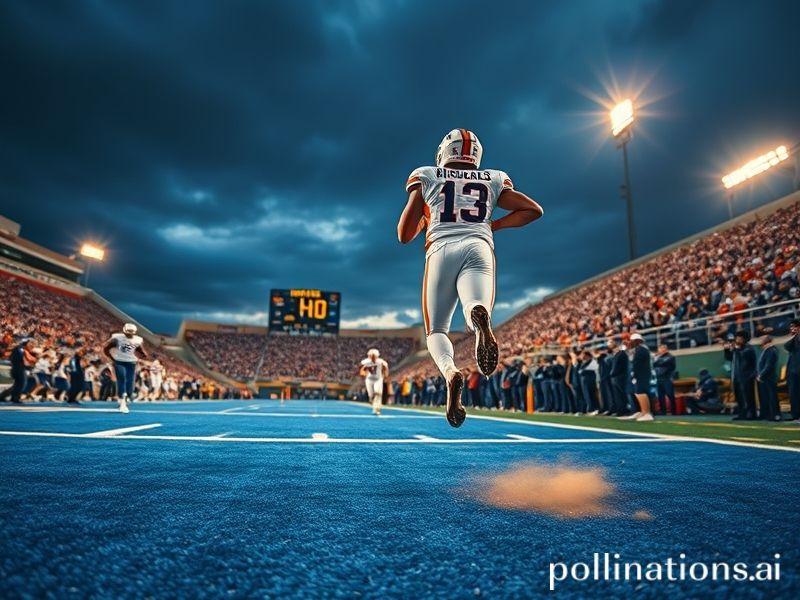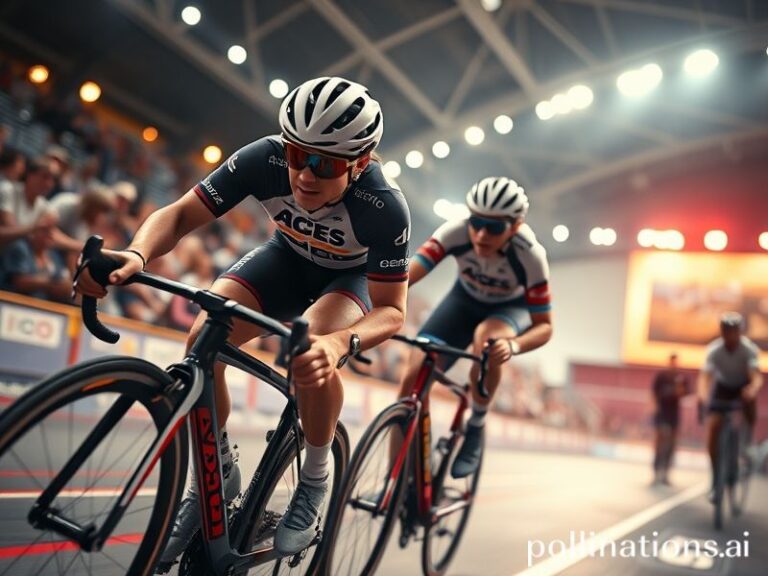From Blue Turf to Blue Helmets: Boise State–Air Force as Global Schaden-Spectacle
Idaho’s capital is not, by any stretch, a geopolitical choke point. Yet on a crisp Saturday evening in late November, the Boise State Broncos and the Air Force Falcons will square off on a rectangle of blue plastic so garish it can be seen from the International Space Station—an orbital fact proudly cited by locals who treat it as evidence that their city, population 235,000, matters somewhere beyond the potato belt. The game itself—American college football, for the uninitiated—will be beamed into living rooms from Lagos to Lahore via streaming services whose algorithms have finally noticed that gambling is the Esperanto of global sport.
To the outside world, this matchup is a Rorschach test of late-imperial entertainment. Europeans, who long ago surrendered their Saturday nights to relegation six-pointers in Stoke, regard the 60-minute commercial smorgasbord as a master class in capitalist pageantry. Asians, still puzzled by a sport that stops every twelve seconds for committee meetings, nevertheless tune in for the same reason they watch Japanese game shows: anthropological curiosity laced with schadenfreude. Africans, increasingly fluent in NIL deals and transfer-portal drama, see a cautionary tale about what happens when universities morph into minor-league franchises wearing mortarboards for branding purposes.
The global implications are, naturally, microscopic—unless you’re one of the 247Sports four-star recruits whose WhatsApp inbox is currently a battlefield of emoji-laden pitches from “Boise NIL Collective” and “Altitude Autonomy Fund.” For them, the choice between smurf-turf and service academy is existential: guaranteed cash now versus the promise of a debt-free aerospace engineering degree and a guaranteed job dropping precision-guided democracy on whichever patch of desert is currently fashionable. It’s a dilemma that would make Sisyphus reach for the Tums.
Bookmakers in Macau and Malta have already installed Boise as a 6.5-point favorite, a line that moved dramatically after a Hong Kong syndicate placed a six-figure wager at 3 a.m.—the same hour, incidentally, that the Air Force football team’s official Twitter account posted a 30-second hype video set to Wagner’s Ride of the Valkyries, because nothing says “amateur sport” like borrowing from the Nazis. Meanwhile, in Kyiv, a startup is live-translating the ESPN broadcast into Ukrainian, overlaying snarky pop-ups that explain why grown men need seventeen coaches to decide whether to punt on fourth-and-inches. Their servers are hosted in Estonia; the irony is free.
Climate change, the subtext du jour, hovers over the proceedings like a circling drone. The artificial turf is manufactured from recycled tires harvested somewhere in Southeast Asia; every five-degree rise in global temperature reportedly makes the surface two degrees hotter, which is good news for the over on total trainers’ ice bags. European viewers—accustomed to carbon-neutral Bundesliga matches—calculate the carbon footprint of flying the Falcons’ triple-option offense 900 miles for a three-hour television slot and decide the planet probably deserves us.
And yet, for all the eye-rolling, the contest offers a pristine snapshot of American soft power. Not through State Department white papers but via marching bands, cheerleaders in sub-zero sequins, and a flyover by two F-35s whose afterburners momentarily drown out the stadium PA, itself blaring “God Bless the U.S.A.”—a song that, to non-American ears, sounds suspiciously like a McDonald’s jingle written by someone who’s read too much Revelation. Somewhere in Tehran, a teenager toggles between this spectacle and drone footage of Gaza, wondering if both feeds are essentially the same genre.
When the final whistle blows—likely after midnight GMT, because television timeouts wait for no time zone—the box score will be uploaded to servers in Iceland before the goalposts finish vibrating. One fan base will storm the field to tear down the posts, another will console itself with the knowledge that service-academy graduates can still land a steady job. The rest of the planet will scroll onward, vaguely amused that a nation capable of putting robots on Mars spends its autumn weekends arguing over whether a 19-year-old stepped out of bounds.
In the end, Boise State vs. Air Force is less about football than about humanity’s limitless capacity to manufacture meaning out of colored turf and unpaid labor. It’s a small, glittering snow globe of American excess—shake it and watch the little fighter jets swirl—gift-wrapped for export. Drink it in, dear world; the next episode ships in seven days.







